More whimsy, more drama
Prologue
This is an intentionally browseable set of weeknotes regarding things I “beheld” over the previous “week”1.
I hope you find something in here that sparks your interest in a piece of media, or encourages you to avoid something when your time could be better spent elsewhere. I write weeknotes mainly to practice a style of writing that isn’t work deliverables or quick emails - but if this helps you please let me know on whatever medium I mentioned this on.
But without putting you off, I’m conscious that as this document builds and builds I risk avoiding reading something because I’m going to have to write it up. Which reminds of common criticism of personal productivity methods, of which this link is one example. So instead of being particularly precise, I’m very much aiming for good enough to remind me of what I watched, and help you make a quick yes/no decision.
Some of the media below is from before my last weeknotes, I found a whole bunch of notes after I uploaded the last post. And there’s no real order except this time I’ve grouped items that reminded me of each other together - except when they didn’t.
I’ve decided that “beheld” is the best word for “things I read such as a book, or watched such as a movie, but didn’t play like a game, or didn’t engage with for work”. Suggestions for better terms are expected, but I’ll probably ignore them, if I “beheld” something it feels like it was worth writing about.
Things I beheld:
Willow is what you expect from this picture.
Willow is what inspired me to title this “more whimsy, more drama” - a major theme from my last weeknotes. I was struck by how much I enjoy media that flits rapidly between a serious context and a lightly humourous one, and makes that transition work. That was very much present in Willow, a series set twenty years after the film of the same name. The wide range between whimsy and drama sometimes worked well, but sometimes was too much even for me. Especially some of the music choices were especially variable, and not sure about some of the acting choices made. But overall it was an enjoyable watch, and you don’t need to be a fan of the original film to get something out of it. But this is definitely a film of its genre, if you’re not a fan of high fantasy this isn’t going to convert you.
All of the above basically applies to Dragon Age: Absolution as well, in its rapid changes in tone and how often that did or didn’t work. This is an animated fantasy series, intended for adults, based on the game of the same name. It was a good watch, but just a good watch. This was the first series but felt like the third, as if I’d come in two series late, with no idea of what I’d missed. The plot was interesting, and complex, and definitely not for younger children.
Similarly I enjoyed the second series of The Legend of Vox Machina on Amazon Prime - but in the same way that you can often spot a film of the book by how it feels, while this is great work you can feel the missing depth from the live play RPG campaign behind this show. I don’t think it’s quite for fans only, but if you try it and it feels like something’s missing, it’s not you.
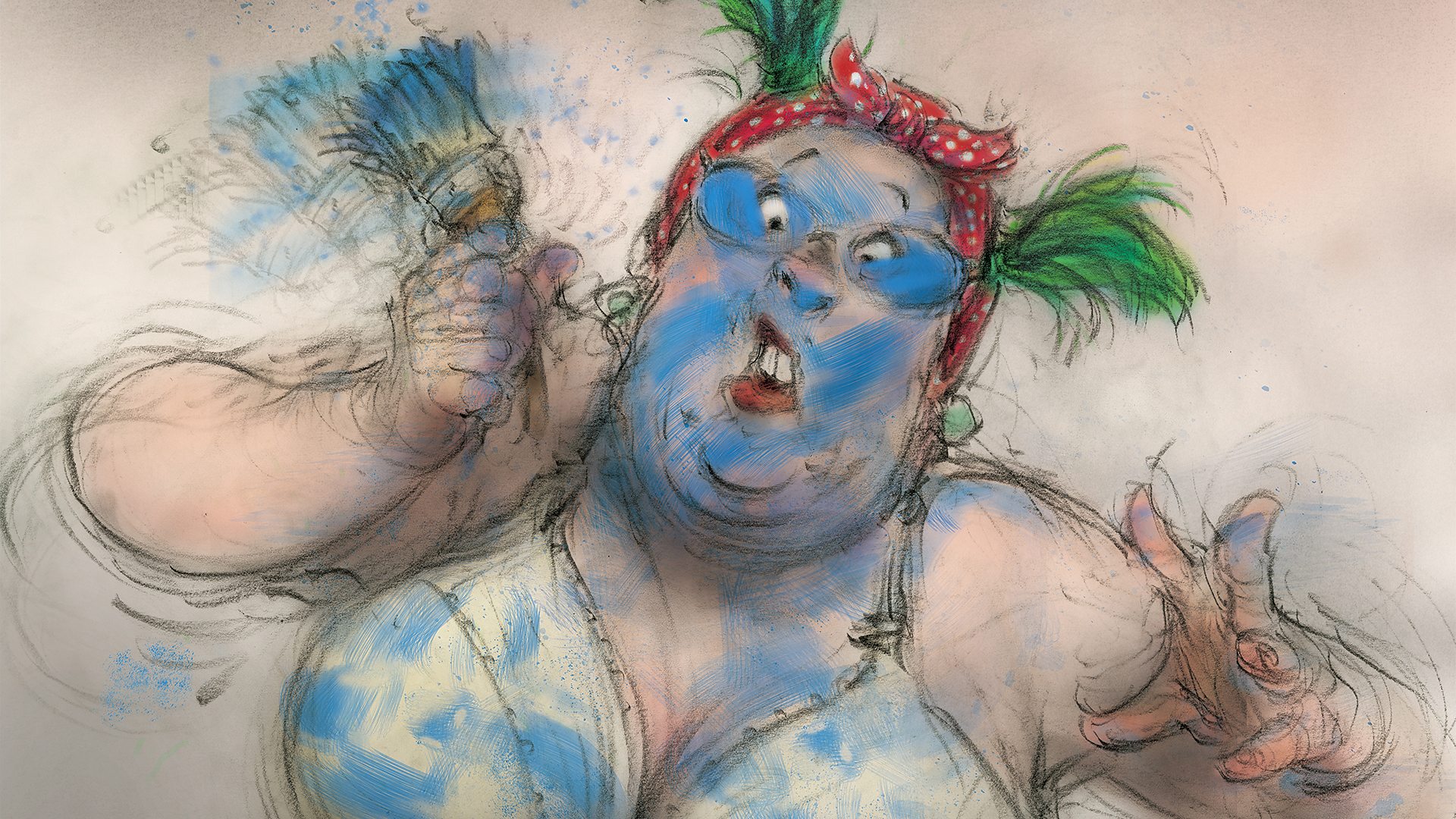
Affairs of the Art.
Of a very different tone, but more animation for adults, is Affairs of the Art. There are many more details here but it’s only 16 minutes long so I suggest just watching it, the engaging and surprising story of a frustrated artist. But bear in mind it’s technically NSFW. You can probably catch it on iPlayer.
Much less adult in presentation and intended audience, but still dealing with adult themes in a sense, do watch The Smeds and the Smoos and The Boy, the Mole, the Fox and the Horse. The latter is especially abstract, but both are just right if you want something to make you think and feel, but not too harshly.
Keeping with animation, Strange Worlds was a good enough film, that you can find on DisneyPlus. It’s a fantastical setting, and by fantastical I mean “normal humans but not on earth as we know it” rather than “there’s orcs”. If the “politics” of your film is important then a quick look at the 1 star and 5 star reviews online will reveal if this is for you - but for me the diversity present made the film more interesting, and gave us a wider range of characters. The ecology of the fantasy world is a big part of the film, and maybe don’t think about it too hard, especially as the film continues. Similarly it wasn’t subtle at points, but as with other animation I’ve watched… maybe I’m just older and wiser than the intended age range? As an online review put it, this isn’t a film for parents to watch with their children, its a film for children to watch with their parents.
A similarly divisive film was Black Panther: Wakanda Forever - I enjoyed it, with good to great acting. Also I thought it impressive in how it respectfully handled the death of the lead within the constraints for the current movie making system, and presumably the requirement to maintain the coherency of the Marvel Cinematic Universe. As with other entries in these weeknotes, it was great to see this kind of mainstream movie from a culture not my own, and rarely featuring someone who looked like me. We’re missing out on so many useful ideas, and so many good stories, otherwise.
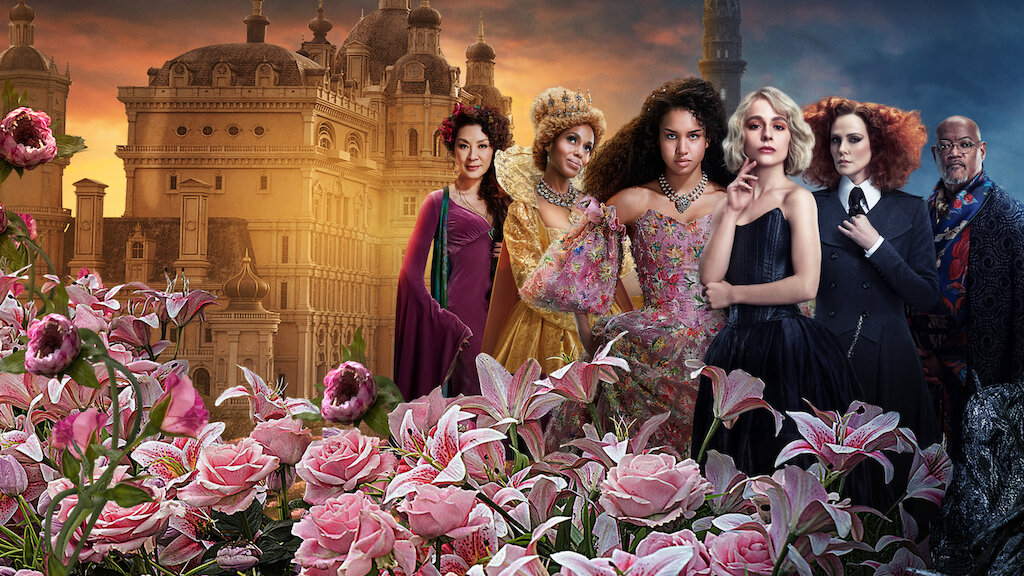
The School of Good and Evil.
The School of Good and Evil was yet another fun film, a Netflix exclusive, a film that parents can watch with their children. While the film very knowingly indulges in fantasy tropes there is a “commitment to the bit”2, meaning there’s no knowing nod to camera, there’s no lack of realism in portraying this faux medieval setting with a fairy tale edge. This is particularly true of the level of talent involved, such as Charlize Theron, Kerry Washington, Laurence Fishburne and Michelle Yeoh. All of whom play this straight and genuinely - they believe they’re in a magical setting so we can believe it to. The overall worldbuilding works, tropey enough to be familiar but also some interesting wrinkles - I always like it when a fantasy situation is taken seriously and then extrapolated logically. I think that the setting gets deeper the more you think about it - the trite division of what is good and evil, and what Good does to maintain order. Also the progression of self-awareness of the characters and their role within - and their contentment with - the system they inhabit. I gather this is an adaptation of the first of six books, and the first of a planned series of films, I look forward to seeing the others.
If you’re intrigued do check out the trailer - I would cite some reviews but they’re mostly disappointing, and feel like they were written without seeing the film, or without judging the film on its own terms3.
I dip in and out, mostly out, of the Star Trek universe. But I did watch the most recent series of Star Trek: Strange New Worlds, likeable characters, involving plots, and making the most of the well established Star Trek universe and tone. As with many other media I like, the work establishes a firm belief in a quite ridiculous universe, omnipotent aliens, time travel, and so on - but it pulls this off through playing everything straight, and makes that work because it is internally consistent4.

Steven Universe.
I finally managed to finish watching Steven Universe, an epic story, very imaginative, great world building, hampered by networks cutting it to pieces.
I also finally watched Goodfellas. Interesting to see scenes or phrases I’d caught before, but in their original context; and also I could see why it was and is so well regarded.
Comedian Drew Lynch’s special Concussed on YouTube was entertaining, funny, and thought provoking. Laugh out loud, and not afraid to tackle difficult subjects; but not to just be offensive or controversial. Some of it didn’t quite land for me, but that’s arguably a good thing - rather than being a more polished and predictable act.
Lynch’s more recent special And These Are Jokes was less predictable, but also less funny. I liked the attitude, and as before I like the willingness to go to some of the subjects covered without being either bluntly offensive or preaching to the converted. But this was very planned, whereas from limited experience Lynch is at his best when he interacts with the crowd, and somehow maintains control of the situation and the conversation, do check out his YouTube channel for examples.

The sequel to Knives Out has a great cast.
Glass Onion: A Knives Out Mystery was a very well made film, enthralling from beginning to end, you can watch it on Netflix. I’d recommend not looking up anything about it - like a classic murder mystery it’s very driven by what you do or don’t know as an audience. To be very obtuse so as to not give anything away - I love the choices made as to what we are and aren’t told. For the film itself the standout aspect for me was the quality of the acting, I felt really engaged as I watched it, and didn’t pick up on plot points or omissions that were apparently obvious to others. I was going to start listing the performances that stood out, especially actors who made me forget where I’d seen them before - but realised I was just listing everybody.
The Traitors completely changed my opinion of reality TV. I wrote more about it here. I also caught some of the American series… I planned to watch the rest because I was intrigued by their choice of mixing “regular” people and celebrities from US reality TV. But a couple of episodes in I just kind of stopped, as my main point of interest was to compare and contrast design choices to the UK version, rather than being invested in who won or lost, and how. Also while Alan Cumming was working well as the presenter, he’s no Claudia Winkleman.
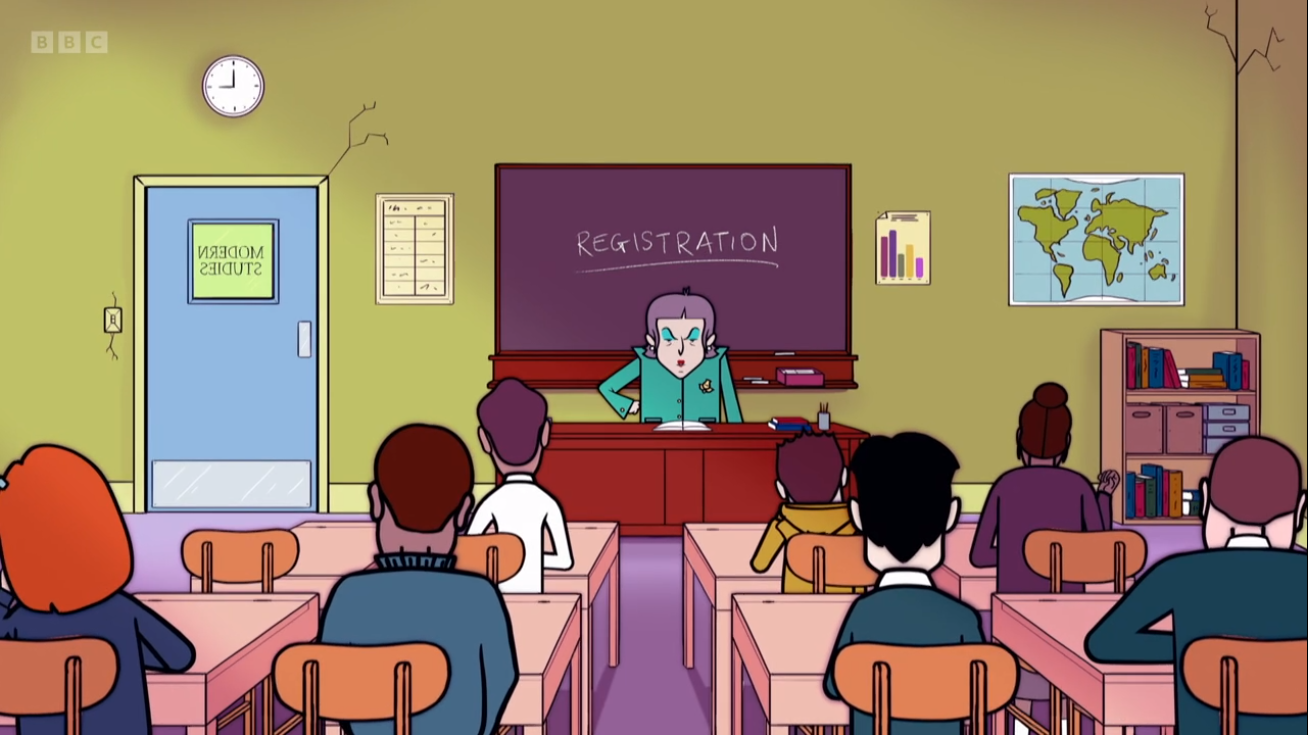
Using this cartoon style was a great choice for the "My Old School" documentary.
Alan Cumming was much better, for me, in My Old School . This is a fascinating portrayal of the story of Brian McKinnon, or Brandon Lee, and is on BBC iPlayer for a while if you’re in the right jurisdiction. This is such a well made documentary, and such great choices are made, that I can’t spoil it with the big reveal. McKinnon did well at school in the seventies, but had to abandon his life’s dream of being a doctor when he failed medical school. But in the nineties, now in his early thirties, he decided to have another go; and so socially engineered his way back into school, pretended to be sixteen, and retook his exams. But he was discovered, and… and there’s more in the documentary.
Not only was this a great documentary, I also loved the choices that were made in its production. For example, while there’s plenty of footage of Brian McKinnon, for example the TV interviews he gave after this was revealed… the situation is shown through descriptions, spoken over cartoon depictions of described events, to really set the scene and bring people’s feelings and reactions to the fore. Also the present-day Brian McKinnon didn’t want to be filmed, so while we hear Brian’s voice, the audio is lip-synced by Alan Cumming, which is executed particularly well. And to me Cumming didn’t try to portray McKinnon in a specific way, or lead the viewer to a specific opinion or angle.
Also, as with my favourite documentaries… no opinions are stated, at most events and comments are juxtaposed to illustrate the differences between what someone remembers and the evidence. And as with my preferred documentaries, it doesn’t foreground the documentarian. Well, kind of, another spoiler, but it is revealed during the documentary that the documentary maker is Jono McLeod, one of the students who befriended Brian. Filming his school friends, and available tutors, within a school setting that fitted the period, was a masterful touch. I would assume McLeod’s perspective led him to not foregrounding the main subject, but covering the thoughts and opinions and feelings for his former classmates. If you’re intrigued, regardless of how much I’ve revealed, I think you’ll still enjoy it.
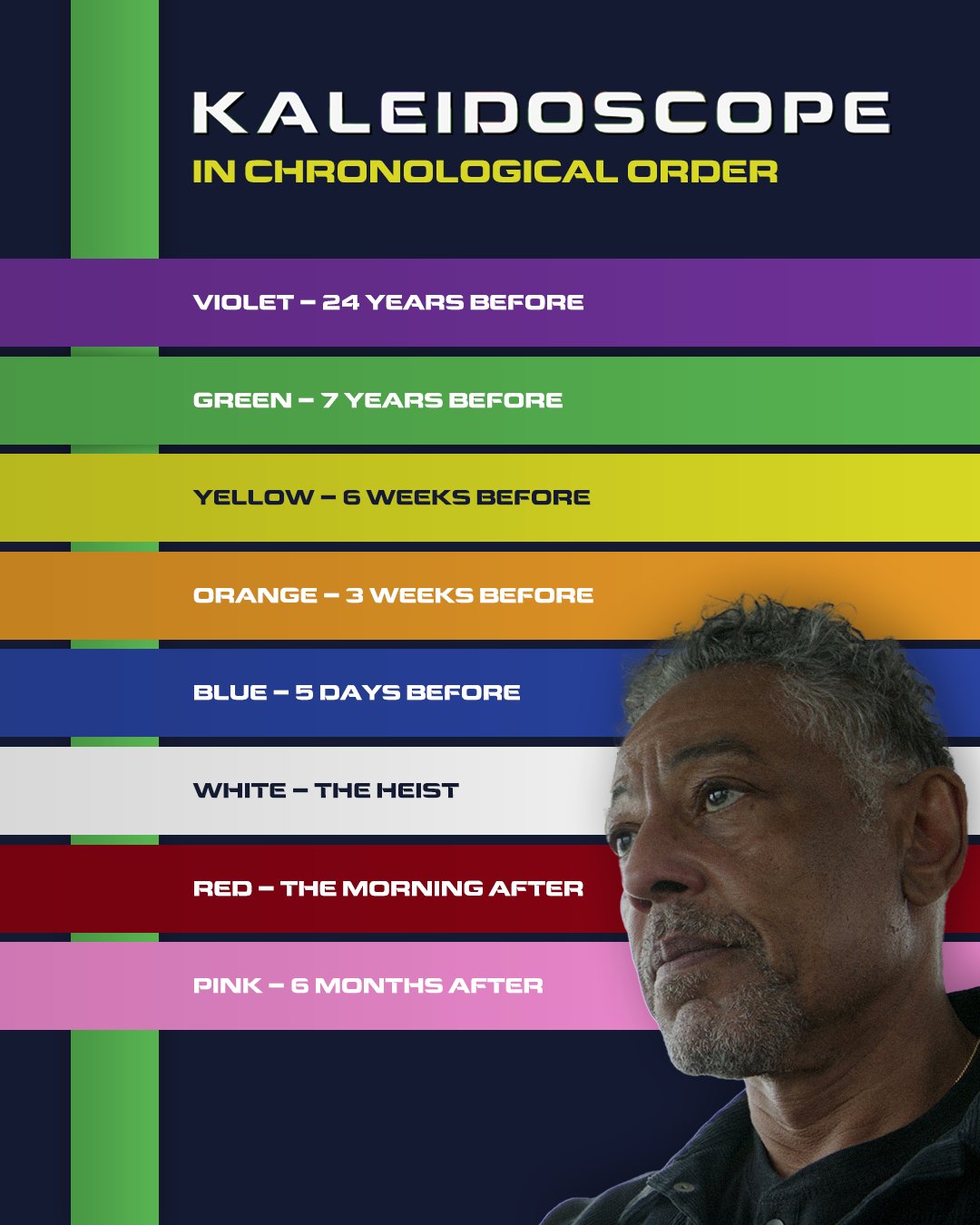
Probably the best order for the episodes of Kaleidoscope.
Meanwhile I thought even more on media format while watching Kaleidoscope - which you can watch on Netflix. This is a heist show, but where you should be able to watch most of the episodes in any order. Well, maybe, this article explains apparent restrictions on randomness imposed by Netflix. We started watching it at random, but got lucky as that started in approximately chronological order. So we quickly decided to watch it in that conventional order, which is: Black, Violet, Blue, Yellow, Green, Orange, White, Red, Pink. The last episode chronologically, Pink, was disappointing and illustrated the problem with the series. If you’ll excuse more obtuseness that should only mean something to those who’ve seen it - the “did she, didn’t she” at the end seemed unnecessary, and throughout it didn’t feel like any episode fully resolved any question another episode might have raised. And the final scene - didn’t make sense; there was no indication that that character had either the resources or the background to commit that kind of action, especially if they planned to get away with it. And I only thought that after having to figure out who that final protagonist was, meaning the ending, rather than being a conclusion, or thought provoking, was essentially a quiz.
So for me it ended kind of sourly, which is a shame. I think it only kind of worked, and I liked the ambition, the performances, the casting, the idea - I’m just not sure about the execution. So what should happen is that Netflix and other organisations push harder to explore how to right this kind of fiction, but I suspect instead we won’t see anything like this for five to ten years. I’m not sure a heist was the right scenario for this, it’s too linear, with a natural progression and a conclusion.
A couple of quick mentions that don’t fit anywhere else, WEIRD: The Al Yankovic Story was fun, weird, but fun. You’ll need some familiarity with Weird Al’s work to “get it”, but if you like his other work, if “wheel of fish” means anything to you, then you’ll like this. If not, see if the teaser trailer appeals. Daniel Radcliffe is particularly good. He’s similarly good in The Lost City, which is yet another action / adventure / comedy film that knows what it is, and is played unironically to make the material work. Mainly due to the characters the film is adorable, and predictable in all the right ways - good for a relaxing evening. Not that plot reveals really matter for this, but rather than pointing you at a conventional trailer, I suggest watching this featurette to give you an idea if this film is for you or not.
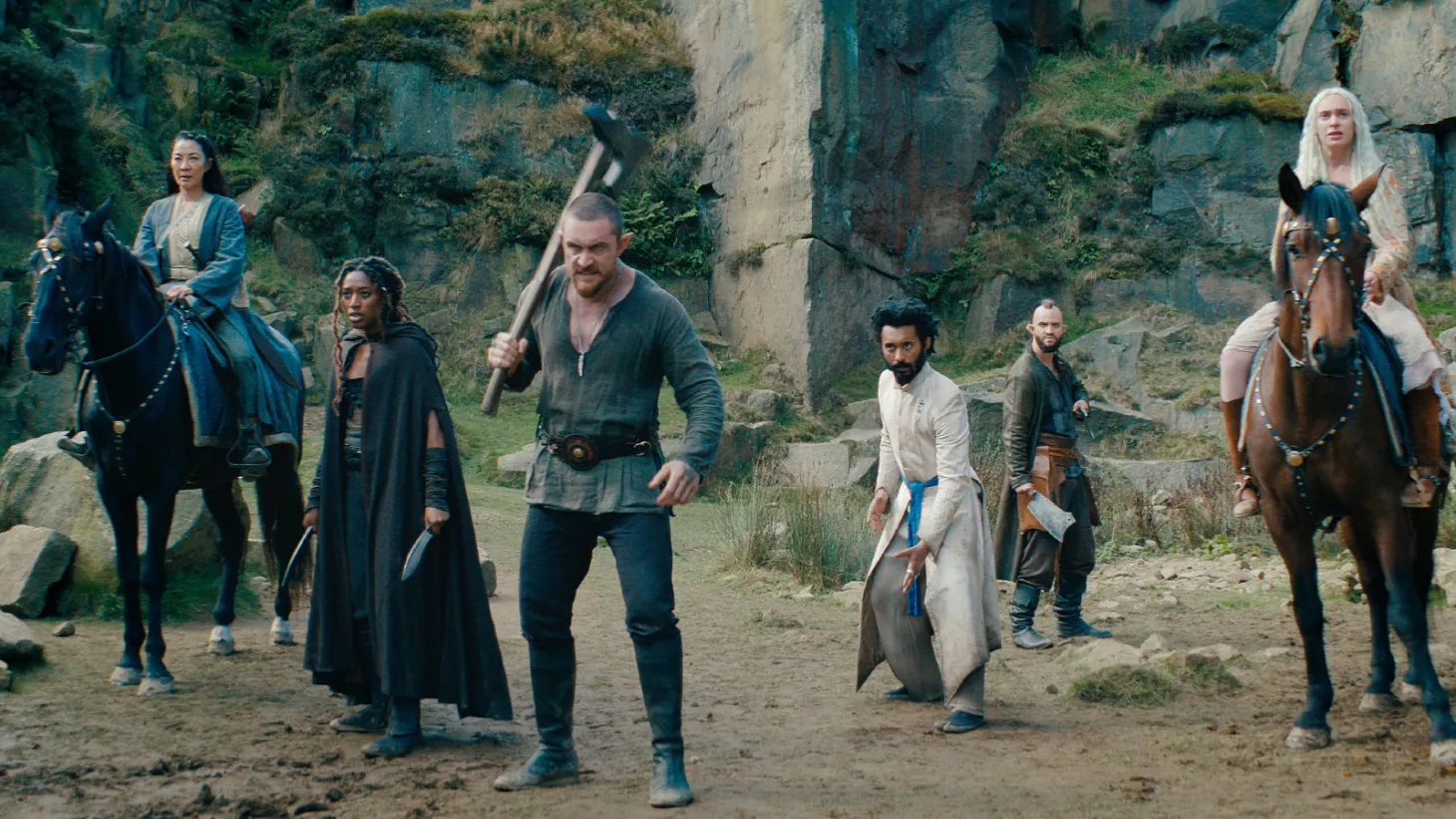
As with Willow, this image tells you all you need to know about Blood Origin.
The Witcher: Blood Origin - is a great binge watch, just the right length at four episodes of forty to sixty minutes. While I’ve no interest or affinity to the main Witcher franchise, either the series or the game, I really liked the world building here. Well, mostly, it felt shallow in parts, for example an evil force empowered Badour - the main villain - because, because it meant the plot could happen. But it is good drama, with good character arcs; and with the use of clans and the “high born” and the “low born” you get an understandable and realistic and tense societal structure very quickly. I enjoyed it, but as “boxing day viewing” rather than being too crunchy. For example, apparently it was originally written as six episodes but was filmed as four, and you can kind of tell.
50 Books To Read If You’re… An Armchair Detective was a surprise present and an interesting read. The title is self-explanatory, and in an age of online search I really like this idea, as it’s something I vaguely aim for in these blogs. The book is a curated list of detective novels to consider, efficient but evocative descriptions of each work and their writer in a single page. A pleasant read, and the author’s character comes through too.

A screenshot from the video game Football Manager.
The Football Manager Documentary a really interesting insight into Football Manager the game, and the enjoyment derived from it by players. I particularly liked that the documentarians were far into the background, and that it was a really fair portrayal of the enthusiasm of the developers and the obsession of some of the gamers. For example I loved the stories of gamers getting “suited and booted” for a particularly important match, I find it really affecting to see a game generate that level of dedication and immersion in its players. This is definitely for those familiar with the game, barely any footage of actual gameplay was shown… but that said, I really enjoyed it and I only know the game by reputation - although I now have a copy of an old version to play on my Xbox 360. With regard to my own half-formed thoughts about online game design, it was intriguing to see how many of the more experienced gamers missed the days of text only descriptions, when their imagination displayed the graphics. I wonder how true that is - or how much is down to nostalgia? I’m not familiar with the game, but I’m intrigued by the idea of it - and I’ve been meaning to get a better understanding of soccer strategies and formations for some time, this might be the way to do it. A lovely surprise present, which it turns out you could watch for free on YouTube.
And just discovering it was on YouTube, I’m reminded that there’s an insightful quote at the start, and relevant to my own efforts to explore situations through games rather than static descriptions or presentations: “You can read a book in a couple of days and be in that universe, but you can’t affect anything. Whereas, with Football Manager every single thing you do affects everything in the universe.” – Miles Jacobson, Football Manager Director.
Not the most well-known Agatha Christie book I expect, but the Short Story Collection Parker Pyne Investigates was an enjoyable read for me. Mildly “of its time” in some attitudes towards gender and race - and if you caught Lucy Worsley’s series on the BBC about Christie, you’ll see a lot of the influences mentioned in her novels in this work. I’d describe the book as concentrated Agatha Christie, tightly written stories and a great bedtime read. Contrary to her novels, where I gather all the pieces are in front of you, in these short stories often it was a hidden detail that was the key. But I never felt deceived as a reader, I think because the character of Parker Pyne at the centre of this all - and the revealed detail often being his knowledge - worked well. I can see why Christie is so revered, I was struck by how such sparse descriptions still managed to set the scene for each story. If you want an occasional read, as something to dip into, it’s recommended.
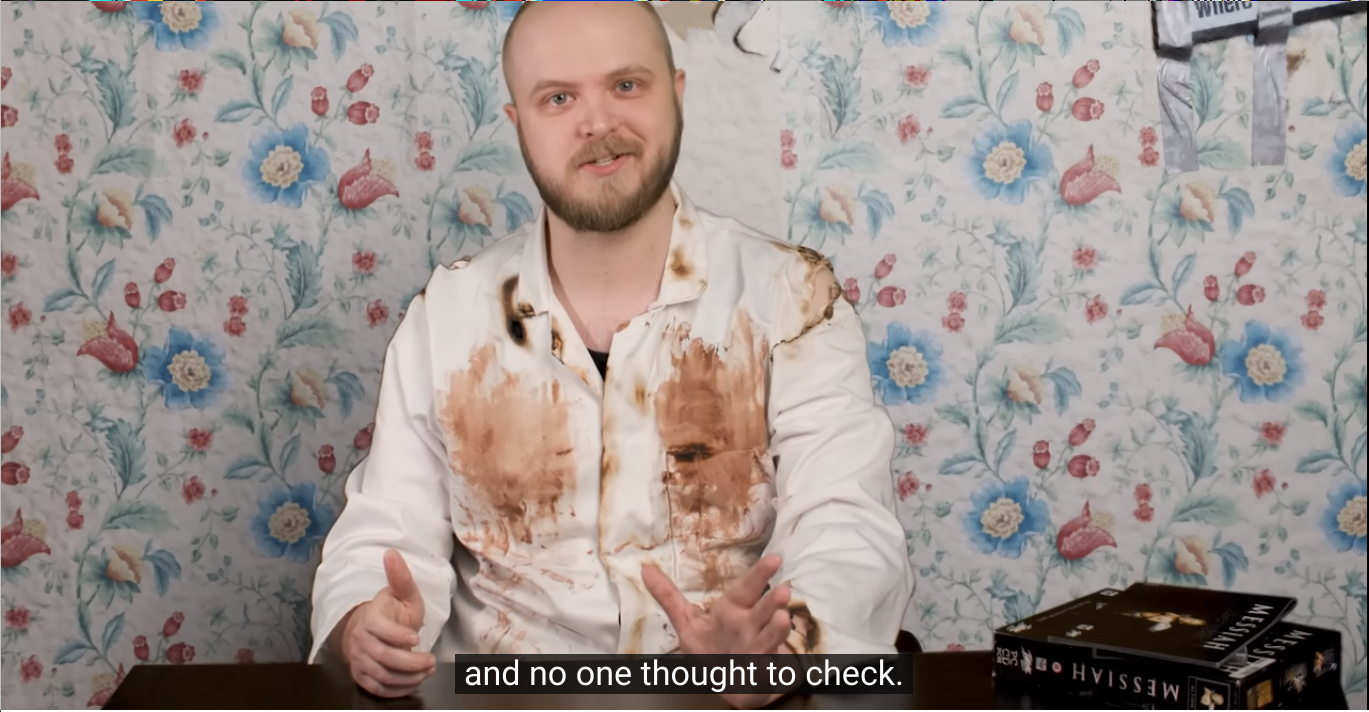
Summing up the "roblox oof" documentary in one screenshot. Oof.
roblox oof, this investigation by hbomberguy, reminds me I should list on here the excellent standard of longer form YouTube videos I watch. In this case - an incredible journey from “where did this in-game sound effect come from?” to “I’m not sure anything this video game stalwart has said is true”. And per the graphic above, where no one thought to check, hbomberguy checks. This is extensive research, with an authentic and engaging presentation style. As for the subject, it reveals what you can get away with if you push hard enough and just keep going - see also this summary of a tennis player who faked their entire career - I’m not sure if the subject of the documentary, Tamarico, actually knows that he’s lying any more. But also, if you ignore the extraordinary claims of Guiness World Records and industry relationships, there’s genuinely a good career in there, it’s a shame that it’s lost when you see him double down on failures like intellivision. For me the two hours to watch this flew by.
Why the World Looks the Same in Any Language is a very well constructed presentation on how people are or aren’t restricted by language. Without any real research I used to like the Sapir-Whorf hypothesis, that language defined how people think, and restricts the ideas that they’re capable of. This presentation by John McWhorter takes the Sapir-Whorf hypothesis apart, while acknowledging how attractive an idea it is. Particularly well put, and with such an engaging speaker, one of the few presentations with sparse text-heavy slides I was able to watch at 1x speed. If you’re interested in people or language or worldviews I recommend watching it, and do stick around for the Q and A and look out for “mushrooms and porridge and soot”… and “vocabulary is not the dictionary”…and “a vocabulary doesn’t have to involve words that are real”.
Similarly just available out there for free, for the cost of watching some adverts, is Working at Valve: ‘A Fearless Adventure’ or ‘Lord of the Flies’? on YouTube. Another well made documentary on the actual working culture at Valve. Very insightful, and if you’re interested in how work might evolve, and the perils of that, worth your time.

Fiction about a democratised military.
I think part of a problem I had with reading for a few years was trying to make too much of it - reading as study, or reading as guaranteed relaxation or enjoyment, rather than treating each book as something you immerse yourself in, take notes from, or put down or put away at any moment. I’ve done well with fiction choices recently, as demonstrated by New Model Army, which I think I picked up in New York many years ago. It has a familiar near future setting in the UK, where a democratically run military for hire makes moment by moment battlefield decisions, and disperses or forms as needed. I liked the introduction, contrasting the battle descriptions of a fully democratic army with the kind of online discourse that level of co-ordination entails. Suggested strategies are put on the army’s wiki, and then the individual soldiers all vote on them. And this contrasted well with matter-of-fact descriptions of the surroundings the protagonist found himself in, and the battles and skirmishes that took place. While the subject matter is tough going, the narrator is engaging and likeable, and very self-aware; and book rattles along at a fair pace. While it covers significant themes the degree to which you engage with them is left to you, so with its short chapters it is a good read for the bedside or the commute.
Throughout the book the view of a traditional military’s inability to innovate, or distribute decision making, was an overly simplistic view of the subject. Similarly communications security, on which the army of the book’s title depended, was just ignored. Lastly, for me, it doesn’t “stick the landing”, and becomes too vague at the end - I would have liked a more literal exploration of the consequences of the ideas in the book.
Also, spurred on by this review, I think there’s a game in this. Put a couple of equally sized forces against each other, one with hierarchical command, one with much more distributed command, and see what works.
As with fiction, when reading to learn it’s also a case of finding the right books to learn from, or skim through. I got some useful game design ideas out of The White Box Essays by Jeremy Holcomb, and need to make space to do something with the accompanying white box of pieces, meeples and dice.
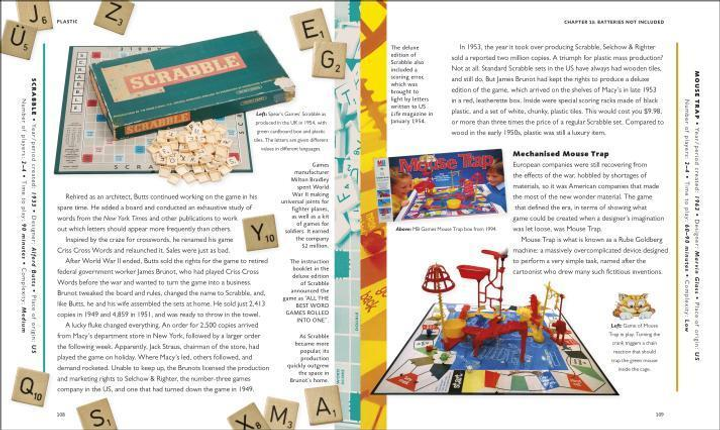
A great layout design for "Board Games in 100 Moves".
Board Games in 100 Moves is a whistlestop tour around the history of gaming - from Senet in 3100 BCE to The Mind in 2018. As you’d expect from authors Ian Livingston and James Wallis, there’s concise explanations and lots of useful illustrations. Great to dip into, and a classic “coffee table” book in that anyone can just pick it up, flick to any page, and find something interesting. There’s more details on the publisher's website.

Another great design, this time for "Mind and Brain".
Mind and Brain: A Graphic Guide is a great idea, I wish more books were like this. I only flicked through it, but the graphical style is enjoyable - even if it does dwell a lot on brain injury. Unfortunately it seems that’s how a lot of the brain’s area specific functionality was discovered. It does end on one of my pet interests though, short but strong pieces on narrative self and what that means for crime and punishment.
Similarly I flicked through Sport: A Very Short Introduction, which will be useful to have around, but is a little outdated.
I read Win Forever, the book in which Pete Carroll, head coach of the Seattle Seahawks, explains his philosophy and how he came to it. A surprisingly inspiring read for this kind of book, but I might be biased as the Seahawks are the team I follow in the NFL. I expect to dip into it again.

The top half of one page of an 200 page playbook.
If I’m being comprehensive, I also worked through a document titled: 1988 Notre Dame Defense Lou Holtz Barry Alvarez, which is Notre Dame’s defensive playbook for their college football team. I skimmed and read for ideas, and I was surprised at how difficult this looked to learn, but interesting nonetheless.
Talking of American Football I stayed up to watch this year’s SuperBowl live. I found it surprisingly unexciting for such a close and apparently exciting game. I don’t know what was missing; maybe, as others have said, it was between fairly evenly matched teams, and there were no strong narratives… outside of NFL media anyway. I hadn’t paid too much attention to the build up this year, not even the “what to look out for” from the better analysts. Also, even for an experienced NFL watcher like me using the NFL Network / Fox feed rather than the ITV - it’s essentially a commercial event with a sport attached. Which might have been a factor in Kansas City’s victory. I mean partly I think the victory was down to the Chiefs’ Offensive Line, who are probably the least recognised and publicised aspect of either team - who kept the Eagles away from their Quarterback for the entire game. But also, I wonder if team’s, and especially the coaches’, more recent experience of a Super Bowl helped Kansas City, it did seem that they came out much stronger in the second half after the extended 40 minute break.

A troll from Dungeons and Drawings.
I finished reading Dungeons & Drawings: An Illustrated Compendium of Creatures - an example page is above. Just an interesting range of creatures and monsters, and a really lovely style. I’m not sure how useful it would be to GMs, but there’s a great variety of ideas, and it’s the classic coffee table book if you just want to browse something.

A main character from so many films, New York; in this case, from "Entergalactic".
Before writing my last weeknotes… three months ago… I watched Entergalactic on Netflix, which is, er, a “vibe”. I mean it’s a film with character development and a plot, but also there’s so much more to it - the film makes the most of the impressions animation can give. It’s slow paced, in a good way - the trailer won’t give too much away, but will show you enough to know if this is for you.
The last film I’ve just watched before writing this, The Batman (2022) was similar at a very abstract level. Of course it’s a live-action grim-dark superhero movie, so actually it’s entirely different, and if you treat it that way then the three hour runtime means it definitely overstays its welcome. But if, like me, you can relax into an engaging but unsurprising superhero film, that requires the usual suspensions of specific disbeliefs5, and are in the right mood to see slightly indulgent shots held for far, far too long, this is similarly enjoyable. Maybe I was just in the right mood for this “ponderous” art. Do check out the trailer to see if you’re feeling ponderous too.
Epilogue
I’ve enjoyed putting this together, especially aiming for nothing more than a kind of glorified listicle. While these always take longer to write than I expect, and I’m pretty sure I can still count the readership on one hand, I find it really useful to collate and curate my thoughts in this way. Do consider doing something the same yourself, blogging or journaling or something inbetween.
-
In my weeknotes terms a “week” is the time period between when I last wrote my weeknotes and now. Your week may be shorter than mine. ↩︎
-
A fairly common phrase in comedy circles, where a comedian commits to a particular style or conceit, such as an impractical costume, but maintains that “bit” regardless of whether it is succeeding or failing. ↩︎
-
If you’re intrigued there’s all sorts of comments here, and for example comparing it to Harry Potter feels like the reviewer hasn’t thought about the themes of either work beyond “there’s a magical school”. Also the derision in this review from the Guardian makes a lot more sense once you look up the reviewer’s background. ↩︎
-
I’d love to take credit for this insight but I read it on the Internet… somewhere, in the last three months or so. ↩︎
-
Most prominently, Batman’s seemingly impervious jaw. ↩︎
